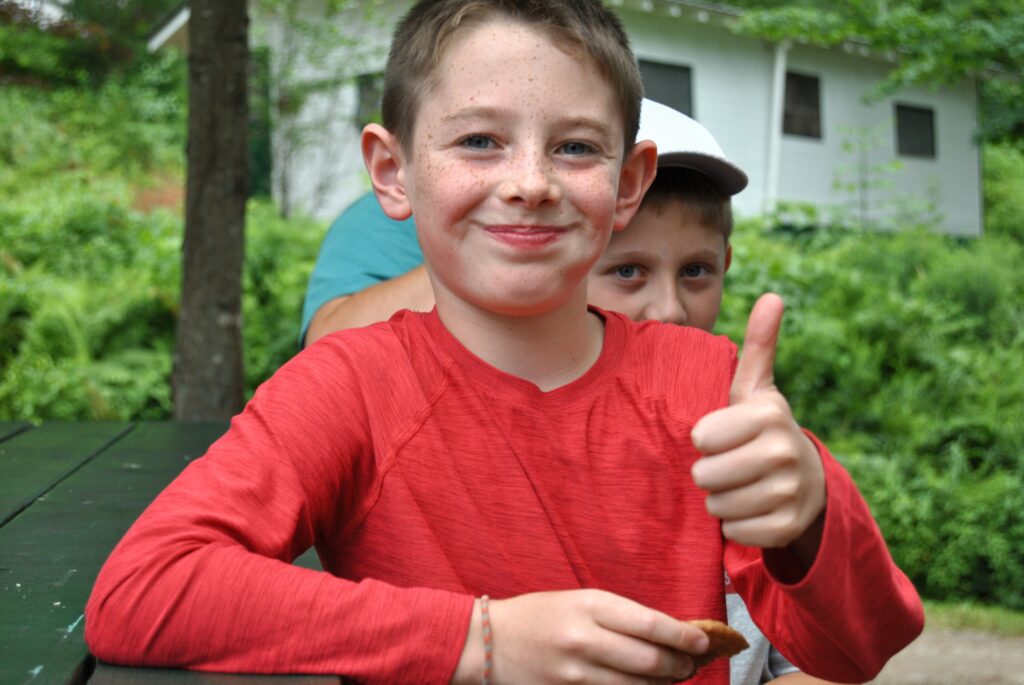Prepping Your Son (and Yourself!) for Sleep-Away Camp
Posted by: Birch Rock Camp

By Francie Campbell, Birch Rock trustee and parent
Congratulations on choosing Birch Rock for your son —you’ve found the perfect, old-fashioned camp. We’re a small, tight-knit community of campers and staff. We cherish our hallowed traditions and rituals. We love our historic Lodge, whitewashed cabins, pristine lake, and towering pines. We all live by our motto Help the Other Fellow. Each staff member is dedicated and well trained to teach activities, nurture campers and keep everyone safe. Every boy is closely observed, and well-known by the staff and by his fellow campers; the whole community comes together for meals, and many activities bring together all age groups on the Hillside.
We recognize that sending your child away to camp for the first time is a big step. Both you and your camper-to-be will undoubtedly feel excitement and some nervousness.
Camping offers your son a thrilling experience in the natural world. It empowers him to discover his independence, and also his interdependency with the other campers and staff in an exhilarating setting.
One of the best things you can do to prepare your son for something this momentous is simple: talk with him. Discuss both the fun and the challenges ahead. Let him voice his concerns. If you bring up camp in a relaxed way over several weeks, it will help him better process the adventure that awaits him this summer.
Topics that might help your child prepare emotionally for camp include feeling homesick, making friends, cooperating, and asking for help.
Homesickness
Anxiety is a completely normal feeling for a child leaving for camp (or as you may have seen, starting to have sleepovers). This uneasiness is a mixture of excitement and a little fear of the unknown, and is usually mild. What can be done to ward off a strong case of homesickness at camp? Arrange practice time away from home. Weekends with grandparents, sleepovers at friends’ houses, and other extended time away from home help show a child he can cope with separation. This deepens his independence and helps him grow in confidence.
When your son first arrives at Birch Rock, he will almost certainly miss something about home. In fact, in study after study, camp researchers found that almost all children spending at least two weeks at overnight camp felt some degree of homesickness. These pangs reflect the fact that he loves his home, and that’s a wonderful thing. Sometimes just understanding that concept can make a camper feel better.
Birch Rock directors will call you about 4 or 5 days after your camper has started his session. You will hear how your son is adjusting. BIRCH ROCK HAS A POLICY OF NOT PERMITTING CAMPERS TO CALL HOME (EXCEPT IN THE CASE OF A FAMILY EMERGENCY). After decades of experience, Birch Rock has found that kids get over their homesickness more easily if they can’t phone home.
Homesickness is a challenge everyone can learn to deal with. What can you do to make getting ready for camp as positive as possible? How can you be proactive in warding off a strong case of homesickness?
- Shop for gear and pack the trunk together. Involve your child to give him a strong sense of ownership.
- Share your confidence, not YOUR concerns. Talk with your son about all the great things he can expect at Birch Rock, and share your anxiety only with adults, including Rich Deering and Mike Mattson.
- Avoid giving your son a mixed message like, “Have a blast at camp. I hope I remember to take care of your hamster.” Giving your child something to fret about while he’s away will increase homesickness.
- DON’T MAKE A PICK-UP DEAL. Telling your son that you’ll come get him if he’s homesick will undermine his confidence and coping abilities. Instead, say that the counselors and campers will help him feel better, because that’s what Birch Rock is all about.
- Allow your child to talk freely about his worries. Answer the “what if” questions—“What if I get lonely? What if the counselors are really strict?”—in a coping-focused way. Try reassurances like, “You’ve made good friends at school and on teams already.” Or, “I’m sure that Birch Rock helps all the campers make new friends.” Or, “Most of the counselors were campers at Birch Rock, and they were chosen because they love the camp and enjoy teaching kids.”
- Tell your son that probably every camper has felt homesick at times, and that it’s completely normal. Emphasize all the great opportunities he’ll have, and enjoy looking with him at our website.
- Emphasize that it always takes a few days to get adjusted, so patience is key. By the time he gets home, he’ll miss all those things that were strange to begin with! He might even talk right away about “Next summer at Birch Rock…”.
What can you do to help your child cope with homesickness at camp? Brainstorm about strategies before he leaves; write a pep-talk letter for him to get the first day at camp (and give it to a staff member on Opening Day); and reinforce your support in letters and postcards to your son during the camp session. Here are some tips to give your son:
- Focus on your activities. Getting excited about soccer or swimming or campcraft will make you feel better.
- Stay positive. Thinking about the cool stuff you can do at camp keeps the focus on fun, not on home.
- Talk to your counselor and your cabin mates. They know about homesickness, and can reassure you.
- Keep your confidence. Kids who stick with their anti-homesickness strategies for a few days almost always feel better.
- Reassure him that he should give himself time to get the hang of it. Everything will be new, but after a few days, the routine, the meals, the bathhouse, and his bunk will feel comfortable.
Making Friends
Camp is about making new friends, and for many Birch Rockers, these friendships last a lifetime. When you talk with your child about making new friends, you might offer this advice: “If you’re feeling shy, try getting to know others by being a good listener. Remember that not everybody in your cabin has to be your close friend, and you don’t have to be everyone else’s best friend. As long as you treat your fellow campers with courtesy and respect, having one or two new friends at Birch Rock is great. If you have more, that’s terrific.”
Remind him that our mottos are Help the Other Fellow and Shake a Hand, Make a Friend. Birch Rock is about fun, but more importantly, it’s about helping boys develop empathy and character.
Cooperating
Let your son know that he, like every other camper, will be part of a small cabin community. Explain that cooperating with others and helping each other out is what makes camp a great bonding experience. Cabin-mates help each other clean up for daily cabin inspections, and just about every activity requires cooperation. Counselors will teach campers the routine and rules with patience. The whole camp, from the youngest to the oldest, pulls together as an amazing team.
Asking for Help
Everyone has good days and bad days (even adults, you might remind him). If something is bothering him, suggest that talking to his cabin counselor is a good place to start. Help your son understand that his counselor might not be able to guess if something is the matter, and that it’s a good idea to speak up. It’s the counselor’s job to make things right, and he wants the boys in his cabin to have fun. Sometimes the counselor will ask the director or head counselor to help take care of the problem—it’s their most important job.
Some Last Thoughts
Remind your young camper of his strong points. Talk about what he does well, but especially about what makes him a terrific person. Point out the things that make him a good friend, and help him recognize his fine qualities. This is an excellent way to support him emotionally as he takes steps toward self-reliance.
Just as important, these conversations can help you cope with your feelings as your child grows up. A child’s independence can leave his parents feeling both proud and wistful. The staff at Birch Rock understands all of these issues, and strives to partner with parents. Our goal, summer after summer, is to make campers and their parents feel happy and confident.
When your child is at camp, you get to take a vacation from parenting. This is a great opportunity for you to relax, recharge and have fun. Don’t feel guilty about it! You’re giving your camper the gift of letting him spread his wings and fly.










